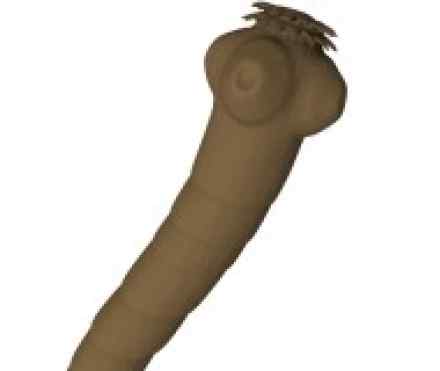
What is it?
Tapeworm infection is caused by ingesting food or water contaminated with tapeworm eggs or larvae. If you ingest certain tapeworm eggs, they can migrate outside your intestines and form cysts in body tissues and organs (invasive tapeworm infection). If you ingest tapeworm larvae, however, they develop into adult tapeworms in the intestines (intestinal tapeworm infection).
An adult tapeworm consists of a head, neck and chain of segments called proglottids. When you have an intestinal tapeworm infection, the tapeworm head adheres to the intestine wall, and the proglottids grow and produce eggs. Adult tapeworms can live for up to 20 years in a host. Intestinal tapeworm infections are usually mild, but invasive tapeworm infections can cause serious complications.
Symptoms
Many people with intestinal tapeworm infection have no symptoms. If you do feel the effects, your symptoms will depend on the type of tapeworm you have and its location. Invasive tapeworm infection symptoms vary depending on where the larvae have migrated.
Intestinal infection
Signs and symptoms of intestinal infection include:
- Nausea
- Weakness
- Loss of appetite
- Abdominal pain
- Diarrhoea
- Weight loss and inadequate absorption of nutrients from food
Invasive infection
If tapeworm larvae have migrated out of your intestines and formed cysts in other tissues, they can eventually cause organ and tissue damage, resulting in:
- Seizures
- Fever
- Cystic masses or lumps
- Allergic reactions to the larvae
- Bacterial infections
- Neurological symptoms or seizures
Causes
The most common types of tapeworm infections in humans are:
- Pork tapeworm (Taenia solium)
- Beef tapeworm (Taenia saginata)
- Dwarf tapeworm (Hymenolepis nana)
- Fish tapeworm (Diphyllobothrium latum)
A tapeworm infection starts after ingestion of tapeworm eggs or larvae.
- Ingestion of eggs. If you eat food or drink water contaminated with feces from a person or animal with tapeworm, you are ingesting microscopic tapeworm eggs. For example, a pig infected with tapeworm will pass tapeworm eggs in its feces, which gets into the soil. If this same soil comes in contact with a food or water source, it becomes contaminated. You can then be infected when you eat or drink something from the contaminated source. Once inside your intestine, the eggs develop into larvae. At this stage, the larvae become mobile. If they migrate out of your intestines, they form cysts in other tissues such as your lungs or liver. Invasive tapeworm infection is more common with pork tapeworm than with the other kinds.
- Ingestion of larvae cysts in meat or muscle tissue. When an animal has a tapeworm infection, it has tapeworm larvae in its muscle tissue. If you eat raw or undercooked meat from an infected animal, you ingest the larvae, which then develop into adult tapeworms in your intestines. Adult tapeworms can measure up to 50 feet long and can survive as long as 20 years in a host. Some tapeworms attach themselves to the walls of the intestine, where they cause irritation or mild inflammation, while others may pass through to your stool and exit your body.
Risk factors
Factors that may put you at greater risk of tapeworm infection include:
- Poor hygiene. Infrequent washing and bathing increases the risk of accidental transfer of contaminated matter to your mouth.
- Exposure to livestock. This is especially problematic in areas where human and animal feces are not disposed of properly.
- Frequent travel to developing countries. Infection occurs more frequently in areas with poor sanitation practices.
- Eating raw or undercooked meats. Improper cooking may fail to kill tapeworm eggs and larvae contained in contaminated pork or beef.
Complications
The consequences of tapeworm infection can vary, depending on what species of tapeworm you're infected with.
Intestinal infection complications
Generally, intestinal tapeworm infections have little or no complications. But if the tapeworms grow large enough, they can block your bile duct, appendix or pancreatic duct, causing problems for those organs.
Invasive infection complications
Invasive infections have a greater likelihood of developing complications, including:
- Brain and central nervous system impairment. Called neurocysticercosis, this especially dangerous complication of invasive pork tapeworm infection can result in headaches and visual impairment, as well as seizures, meningitis, hydrocephalus or dementia. Death can occur in severe cases of infection.
- Organ function disruption. When larvae migrate to tissues or organs in your body, they develop into lesions or cysts. Over time, they grow larger, and sometimes their size can disrupt organ function, or they can grow so large that they rupture. In other cases, cysts put pressure on nearby blood vessels, hindering circulation or causing blood vessels to rupture. Surgery or organ transplantation may be needed in severe cases.
Diagnosis
Intestinal infections
When you have an intestinal tapeworm infection, eggs and sometimes tapeworm segments are passed in your stool, where they can be identified as a tapeworm infection. However, they are released irregularly and the segments may be broken down by the time they pass through your digestive system. So while it's possible to see tapeworm segments in your stool, it's more likely that your doctor will need to check your stool or send samples to a laboratory for testing.
A laboratory may use microscopic identification techniques to check for eggs or tapeworm segments in your feces. Because the eggs and segments are passed irregularly, the lab may need to collect two to three samples over a period of time to detect the parasite. Eggs are sometimes present at the anus, so your doctor may use the "Scotch tape test," in which a piece of transparent tape is pressed to the anus to collect eggs for microscopic identification.
Invasive infections
For tissue-invasive infections, your doctor may also test your blood for antibodies your body may have produced to fight tapeworm infection. The presence of these antibodies indicates tapeworm infestation. Certain types of imaging, such as CT or MRI scans, X-rays or ultrasounds of cysts, also may suggest the diagnosis.
References
http://www.webmd.com/digestive-disorders/tapeworms-in-humans
http://www.mayoclinic.org/diseases-conditions/tapeworm/basics/causes/con-20025898
http://www.irishhealth.com/article.html?con=406
http://www.hse.ie/eng/health/az/D/Diphyllobothrium-latum/Treating-a-tapeworm-infection.html



